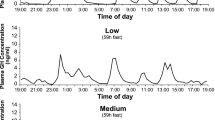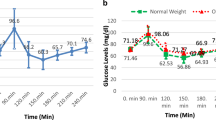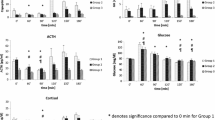Abstract
Recent studies suggest that opioid peptides may influence the secretion of pituitary gland hormones. Since obese patients often show impaired growth hormone (GH), prolactin (PRL) and cortisol responses to stimuli and raised beta endorphin levels, the opioid regulation of such hormone secretion could be diffefent from that in normal weight subjects. In order to verify this hypothesis we studied the effect of iv naloxone, an opiate receptor antagonist, on GH, PRL and cortisol response to insulin-induced hypoglycemia in 9 obese female subjects. Seven normal weight females were used as control group. A control test using saline showed that the PRL and GH responses to insulin stress were impaired in obese subjects, whereas no difference was seen in the cortisol response. Naloxone did not modify the PRL and GH response but provoked a rise in the cortisol response in both obese and normal weight subjects. These findings suggest that while the opioid peptides do not play an important role in regulating the GH and PRL response to insulin hypoglycemia, they influence the cortisol response. In obese patients the impairment in GH and PRL response to stimuli cannot be related to alterations in opioid peptide regulation.
Similar content being viewed by others
References
Delitala G., Grossman A., Besser M. Differential effects of opiate peptides and alkaloids on anterior pituitary hormone secretion. Neuroendocrinology 37: 275, 1983.
Tolis G., Hickey J., Guyda H. Effects of morphine on serum growth hormone, cortisol, prolactin and thyroid stimulating hormone in man. J. Clin. Endocrinol. Metab. 41: 797, 1975.
Grossman A., Stubbs W.A., Gaillard R.C., Delitala G., Ress L.H., Besser G.M. Studies of the opiate control of prolactin, GH and TSH. Clin. Endocrinol. (Oxf.) 14: 381, 1981.
Stubbs W.A., Delitala G., Jones A., Jeffcoate W.J., Edwards C.R.W., Ratter S.J., Besser G.M., Bloom S.R., Alberti K.G.M.M.: Hormonal and metabolic responses to an enkephalin analogue in normal men. Lancet 2: 1225, 1978.
Demura R., Suda T., Wakabayashi I., Yoshimura M., Jibiki K., Odagiri E., Demura H., Shimuze K. Plasma pituitary hormone response to the synthetic enkephalin analog (FK33-824) in normal subjects and patients with pituitary diseases. J. Clin. Endocrinol. Metab. 62: 263, 1981.
Pontiroli A.E., Baio G., Stella L., Crescenti A., Girardi A.M. Effects of naloxone on prolactin, luteinizing hormone and cortisol responses to surgical stress in humans. J. Clin. Endocrinol. Metab. 55: 378, 1982.
Moretti C., Fabbri A., Gnessi L., Cappa M., Calzolari A., Fraioli F., Grossman A., Besser G.M. Naloxone inhibits exercise-induced release of PRL and GH in athletes. Clin. Endocrinol. (Oxf.) 18: 135, 1983.
Serri O., Rasio E., Somma M. Effects of naloxone on insulin induced release of pituitary hormones. J. Clin. Endocrinol. Metab. 53: 206, 1981.
Spiler I.J., Molitch M.E. Lack of modulation of pituitary hormone stress response by neural pathways involving opiate receptors. J. Clin. Endocrinol. Metab. 50: 516, 1980.
Wakabayashi I., Demura R., Miki N., Ohmura E., Miyshi H., Shizume K. Failure of naloxone to influence plasma growth hormone, prolactin and cortisol secretion induced by insulin hypoglycemia. J. Clin. Endocrinol. Metab. 50: 597, 1980.
Grossman A., Bouloux P., Price P., Drury P.L., Lam K.S.L., Turner T., Thomas J., Besser G.M., Sutton J. The role of opioid peptides in the hormonal responses to acute exercise in man. Clin. Sci. 67: 483, 1984.
Mayer G., Wessel J., Kobberling J. Failure of naloxone to alter exercise-induced growth hormone and prolactin release in normal men. Clin. Endocrinol. (Oxf.) 13: 413, 1980.
Jung R.T., Campbell R.G., James W.P., Callingham B.A. Altered hypothalamic and sympathetic responses to hypoglycemia in familial obesity. Lancet 1: 1043, 1982.
Kopelman P.G., White N., Pilkington T.R.E., Jeffcoate S.L. Impaired hypothalamic control of prolactin secretion in massive obesity. Lancet 1: 747, 1979.
Williams T., Berelowitz M., Joffe S.N., Thorner M., Rivier J., Vale W., Frohman L.A. Impaired growth hormone response to growth hormone-releasing factor in obesity: a pituitary defect reversed with weight reduction. N. Engl. J. Med. 311: 1403, 1984.
Girard J., Stahl M., Nars P.W., Baumann J.B. Endocrine disturbance in childhood obesity, growth hormone and cortisol response to insulin induced hypoglycemia. Klin. Wochenschr. 50: 706, 1972.
Goth M., Gonczi J. Effects of insulin-induced hypoglycemia in the plasma cortisol and growth hormone levels in obese and diabetic persons. Endokrinologie 60: 8, 1972.
Genazzani A.R., Facchinetti F., Petraglia F., Pintor G., Corda C. Hyperendorphinemia in obese children and adolescent. J. Clin. Endocrinol. Metab. 62: 36, 1986.
Givens J.R., Wiedemann E., Andersen R.N., Kitabchi A.E. ß-endorphin and ß-lipotropin plasma levels in hirsute women: correlation with body weight. J. Clin. Endocrinol. Merab. 50: 975, 1980.
Plewe G., Schneider U., Krause U., Beyer J. Naloxone increases the response of growth hormone and prolactin to stimuli in obese human. J. Endocrinol. Invest 10: 137, 1987.
National Diabetes Data Group. Classification and diagnosis of diabetes mellitus and other categories of glucose intolerance. Diabetes 28: 1039, 1979.
Snowden E.U., Khan-Dawood F.S., Dawood M.Y. The effect of naloxone on endogenous opioid regulation of pituitary gonadotropins and prolactin during the menstrual cycle. J. Clin. Endocrinol. Metab. 59: 298, 1984.
Paterson S.J., Robson L.E., Kosterlitz H.W. Classification of opioid receptors. Br. Med. Bull. 39: 31, 1983.
Morley J.E., Baranetsky N.G., Wingert T.D., Carlson H.E., Hershman J.M., Melmed S., Levin S.R., Jamison K.R., Wietzman R., Chang R.J., Varner A.A. Endocrine effects of naloxone-induced opiate blockade. J. Clin. Endocrinol. Metab. 50: 251, 1980.
Taylor T., Dluhy R.G., Williams G.H. Beta-endorphin suppressed adrenocorticotropin and cortisol levels in normal human subjects. J. Clin. Endocrinol. Metab. 57: 592, 1983.
Rabinowe S.L., Taylor T., Dluhy R.G., Williams G.H. Beta-endorphin stimulates plasma renin and aldosterone release in normal human subjects. J. Clin. Endocrinol. Metab. 60: 485, 1985.
Pfeiffer A., Herz A. Endocrine actions of opioids. Horm. Metab. Res. 16: 386, 1984.
Grossman A., Besser G.M. Opiates control ACTH through a nor-adrenergic mechanism. J. Clin. Endocrinol. 17: 287, 1982.
Volavka J., Bauman J., Pevnick J., Reker D., James B., Cho D. Short-term hormonal effects of naloxone in man. Psychoneuroendocrinology, 5: 225, 1980.
Krieger D.T., Martin J.P. Brain peptides. N. Engl. J. Med. 304: 876, 1981.
Guillemin R., Vargo T., Rossier J., Minick S., Ling N., River C., Vale W., Bloom F. Beta-endorphin and adrenocorticotropin are secrete concomitantly by the pituitary gland. Science 197: 1367, 1977.
Buckingham J.C., Hodges J.R. Opioids and hypothalamo-pituitary-adrenocorticotropin activity in the rat. J. Physiol. 295: 70, 1979.
Leslie R.D.G., Prescott R.W.G., Kendall-Taylor P., Cook D., Wightman D., Ratcliffe J., Ingram M.C. Opiate receptor blockade and diurnal pituitary and adrenal hormone levels. Horm. Metab. Res. 17: 86, 1985.
Chevkin C., Cox B.M., Goldstein A. Stereospecific opiate binding in bovine adrenal medulla. Mol. Pharmacol. 15: 751, 1979.
Beyer H.S., Parker L., Li C.H., Stuart D., Sharp B.M. Beta-endorphin attenuates the serum cortisol response to exogenous adrenocorticotropin. J. Clin. Endocrinol. Metab. 62: 808, 1986.
Author information
Authors and Affiliations
Rights and permissions
About this article
Cite this article
Papalia, D., Lunetta, M. & Di Mauro, M. Effects of naloxone on prolactin, growth hormone and cortisol response to insulin hypoglycemia in obese subjects. J Endocrinol Invest 12, 777–782 (1989). https://doi.org/10.1007/BF03350058
Received:
Accepted:
Published:
Issue Date:
DOI: https://doi.org/10.1007/BF03350058




